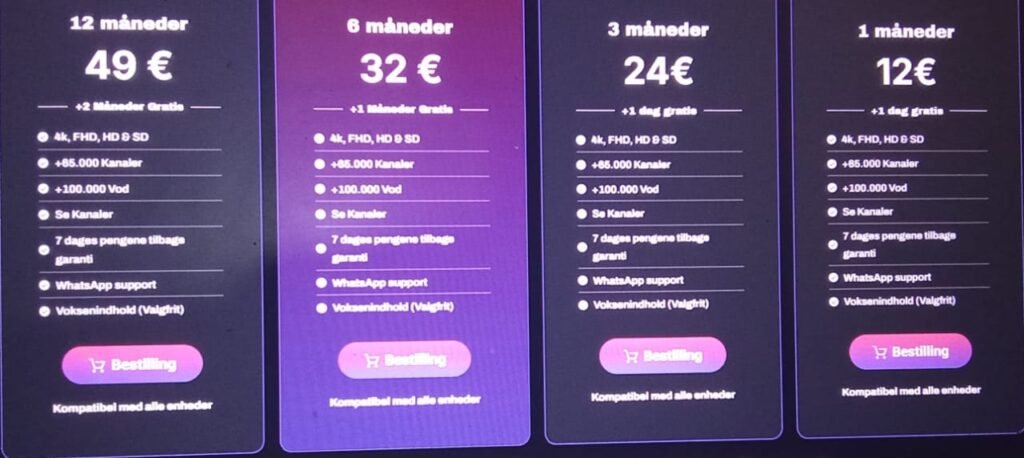,Advantages and Disadvantages of IPTV or Internet Protocol Television, has become a popular alternative to traditional cable and satellite television. It delivers television content over the internet, offering more flexibility and interactivity. One of the major advantages of IPTV is on-demand content, allowing users to watch shows and movies at their convenience. High-definition (HD) and even 4K content are often readily available. Additionally, IPTV can be accessed on multiple devices, including smartphones, tablets, smart TVs, and computers.
However, IPTV isn’t without its drawbacks. The quality of service largely depends on internet speed and stability. Users in areas with poor internet connectivity may experience buffering, lag, or outages. Moreover, legal and security issues are a concern—many IPTV providers operate in a grey area, offering pirated content that could expose users to legal repercussions or malware risks.

Advantages and Disadvantages of IPTV: The Pros and Cons You Need to Know
IPTV stands for Internet Protocol Television. Unlike traditional broadcast or cable formats, IPTV delivers content using IP networks. It supports three main types: live television, time-shifted media (like catch-up TV), and video on demand (VOD).Cutting the cord” has become a global movement, with millions of households opting to cancel traditional TV subscriptions in favor of IPTV services. The driving force behind this trend is the desire for greater control, lower costs, and a more tailored viewing experience.
Pros:
- Access to global channels and exclusive content
- Affordable subscription plans
- Customizable content based on preferences
Cons:
- Requires high-speed internet
- Some services lack customer support
- Risk of using illegal IPTV services
Overall, understanding these pros and cons helps users make an informed decision about whether IPTV is the right choice for their entertainment needs.
Is IPTV Worth It? Exploring the Benefits and Drawbacks
Whether IPTV is worth the investment depends on individual preferences and circumstances. For tech-savvy users with reliable high-speed internet, IPTV offers unmatched convenience, variety, and cost-effectiveness. Services often include premium channels, sports packages, and international content.
On the flip side, users must be cautious. Not all IPTV providers are legal or trustworthy. Subscriptions might be terminated without notice, and some providers lack customer service. Also, while IPTV is generally cheaper, there may be hidden fees, such as needing a VPN or extra hardware.

The Upsides and Downsides of IPTV Streaming Services
IPTV streaming services have transformed how audiences consume content. Platforms like Netflix and Amazon Prime are technically forms of IPTV and demonstrate the potential of this technology.
Upsides:
- Flexibility to watch anytime, anywhere
- No need for physical infrastructure like satellite dishes
- Personalization features
Downsides:
- Heavy reliance on internet bandwidth
- Possible breaches of copyright laws
- Variable content quality depending on the provider
Consumers should research thoroughly before subscribing to an IPTV service.

IPTV: Revolutionizing TV or Risky Business?
The rise of IPTV is a double-edged sword. It has revolutionized television by decentralizing content delivery and empowering users to select what, when, and how they watch.
However, it is also risky. The legal ambiguity surrounding many IPTV providers creates uncertainty. Pirated streams may work today but disappear tomorrow. Furthermore, some IPTV apps and services can be exploited by hackers, potentially compromising personal information.
Thus, while IPTV presents groundbreaking benefits, users must tread carefully and opt for legal, reputable services.
Pros and Cons of IPTV Compared to Traditional Cable TV
Compared to traditional cable TV, IPTV has numerous advantages:
- Greater content selection
- Often more affordable
- On-demand features
- Multi-device support
However, traditional cable has its strengths too:
- Reliable service not affected by internet issues
- More secure and regulated
- Generally includes better customer support
IPTV suits a modern lifestyle, but those who prioritize stability might still prefer cable.
Why People Love IPTV — And Why Some Avoid It
Why People Love It:
- Binge-watching capability
- International content and live sports
- User-friendly interfaces
Why Some Avoid It:
- Unreliable streaming quality
- Legal uncertainties
- Ethical concerns over pirated content
The experience can vary greatly depending on the IPTV provider and user expectations.
IPTV Services: Convenience vs. Legality and Stability
Convenience is the biggest selling point for IPTV. Users can access thousands of channels and movies with a few clicks. Portability across devices also makes IPTV appealing.
Yet this convenience often comes at a cost. Many IPTV services operate without proper licensing, posing legal risks. Plus, service can be unstable, with channels disappearing or freezing unexpectedly.
Choosing a legitimate IPTV service is crucial for avoiding these pitfalls.Traditional TV operates through cable, satellite, or terrestrial broadcast signals. The content is broadcasted in a linear fashion, with shows scheduled at specific times, giving viewers limited control over when and how they watch their favorite programs. IPTV, on the other hand, utilizes internet networks to deliver television content. This enables users to stream content live or on-demand, anytime and anywhere, across a wide range of devices.
The major difference also lies in interactivity and personalization. IPTV allows viewers to interact with the content—pause, rewind, or fast-forward—while traditional TV offers a passive viewing experience. Moreover, IPTV platforms often come with customizable packages that include everything from sports and movies to international news channels, tailored to individual preferences.
The Evolution of Television: IPTV Compared to Traditional Broadcasting
The history of television began with analog signals transmitted over the airwaves. These early systems offered only a few channels, with limited control over what was broadcast. With the advent of cable and satellite television, viewers were introduced to a broader range of programming, but the experience remained largely linear. The turning point came with the introduction of digital technology and the internet.
IPTV represents the next stage in this evolution. By leveraging broadband internet, IPTV has broken free from the constraints of traditional broadcasting. This new model supports a wide range of interactive features, including Video on Demand (VOD), catch-up TV, and personalized recommendations. Moreover, IPTV is more scalable, allowing service providers to reach global audiences without the need for expensive infrastructure like satellites or cable networks.
This evolution reflects broader trends in media consumption. Modern viewers value convenience, personalization, and multi-platform access. IPTV meets these expectations by enabling streaming on smartphones, tablets, laptops, and smart TVs. Traditional TV, in contrast, remains tied to scheduled broadcasts and limited by regional infrastructure, making it less adaptable to the needs of today’s digital consumers.Advantages and Disadvantages of IPTV Advantages and Disadvantages of IPTV Advantages and Disadvantages of IPTV Advantages and Disadvantages of IPTV Advantages and Disadvantages of IPTV Advantages and Disadvantages of IPTV Advantages and Disadvantages of IPTV Advantages and Disadvantages of IPTV Advantages and Disadvantages of IPTV Advantages and Disadvantages of IPTV Advantages and Disadvantages of IPTV Advantages and Disadvantages of IPTV Advantages and Disadvantages of IPTV Advantages and Disadvantages of IPTV,
Streaming or Satellite? Understanding IPTV and Traditional TV
To truly understand the difference between IPTV and traditional TV, it’s essential to compare their technical infrastructures and user experiences. Traditional TV, particularly satellite and cable systems, involves the distribution of broadcast signals from a central source to individual households. These signals are received through a dish or cable box, and content is delivered in real-time according to a pre-set schedule.
9. Is IPTV the Future of Television? Weighing the Pros and Cons
IPTV is undoubtedly a major force in the future of television. Its ability to integrate with smart home systems, adapt to user preferences, and deliver high-definition content makes it very appealing.
Still, challenges remain. Regulatory frameworks are struggling to keep pace with the technology. Until these are addressed, IPTV will continue to straddle the line between innovation and controversy.
If these issues are resolved, IPTV could become the dominant format for content delivery.
10. Before You Subscribe to IPTV: Benefits and Limitations to Consider
Benefits to Consider:
- Custom playlists and interface personalization
- Greater control over what you watch
- Extensive libraries of on-demand content
Limitations to Consider:
- Varying service quality
- Dependence on stable internet
- Potential need for additional hardware or VPN
Prospective users should weigh these aspects carefully before committing to a subscription.IPTV Explained: A Modern Alternative to Traditional Television
IPTV delivers television services using Internet Protocol (IP) technology. Instead of transmitting content through traditional radio frequency methods, IPTV streams content via private or public internet networks. This allows for a more dynamic, interactive, and customizable viewing experience.
There are three primary types of IPTV services:
Live IPTV: Streams live TV channels in real time, similar to traditional TV.
Time-Shifted IPTV: Allows users to watch previously aired programs, ideal for those who miss live broadcasts.
Video on Demand (VOD): Offers a library of movies, shows, and other content that can be watched at any time.
These services are accessible through various devices including smart TVs, smartphones, tablets, gaming consoles, and computers. As internet speeds continue to improve globally, IPTV is becoming a more feasible and attractive option for millions of households.
Is IPTV Better Than Traditional TV? A Side-by-Side Comparison
| Feature | IPTV | Traditional TV |
|---|---|---|
| Delivery Method | Internet | Cable/Satellite/Antenna |
| Content Availability | On-demand + Live | Scheduled Live |
| Device Compatibility | Smart TVs, Phones, Tablets, PCs | TVs with set-top boxes |
| Interactivity | High (pause, rewind, VOD, etc.) | Low |
| Cost Efficiency | Often cheaper | Often more expensive |
| Internet Dependency | Yes | No |
| Geographic Flexibility | Global | Limited by region |
| Customization | High | Low |
| Setup Requirements | Minimal (app install) | Requires hardware installation |
| Weather Dependency | No | Yes (for satellite) |
Conclusion
IPTV offers an exciting alternative to traditional broadcasting, with many benefits for the modern viewer. From cost savings to vast content libraries, the pros are compelling. However, the cons—especially legality and reliability—should not be ignored. The key is to choose a trustworthy, legal IPTV provider and ensure your internet connection can support high-quality streaming. As technology evolves, IPTV may become the gold standard for television—provided it can overcome its current challenges.
